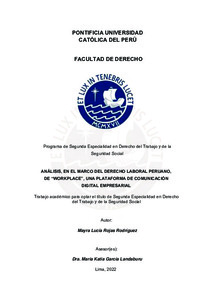| dc.contributor.advisor | García Landaburu, María Katia | |
| dc.contributor.author | Rojas Rodríguez, Mayra Lucía | |
| dc.date.accessioned | 2023-04-02T22:36:55Z | |
| dc.date.available | 2023-04-02T22:36:55Z | |
| dc.date.created | 2022 | |
| dc.date.issued | 2023-04-02 | |
| dc.identifier.uri | http://hdl.handle.net/20.500.12404/24609 | |
| dc.description.abstract | A través del presente artículo se analiza, desde una perspectiva laboral, la
incorporación de plataformas de comunicación digital empresarial en los centros
de trabajo, específicamente, con el uso de “Workplace”, un software que cuenta
con las características de una red social y cuyo objetivo es el de mejorar el flujo
de comunicación y organización entre los trabajadores que comparten el mismo
centro de trabajo. Así pues, a partir de abordar las características y objetivos de
esta red social, así como, el tipo de información de índole laboral y personal que
se comparte en los perfiles de cada trabajador, se procede a desarrollar un
análisis desde la perspectiva del derecho laboral peruano, en el que se cuestiona
si, con del uso de esta plataforma se pondría en riesgo la protección y respeto de
los derechos laborales de los trabajadores y, a su vez, si ello implicaría un exceso
en el ejercicio de las facultades por parte del empleador. Por un lado, se realiza
un balance de la información compartida en torno a qué tipo de datos pueden
tener fines laborales y cuáles otros podrían implicar un menoscabo a la dignidad
y la protección de los datos personales de cada trabajador. Si bien la legislación
peruana no regula de manera específica la protección de este último en el ámbito
laboral, es posible realizar un análisis, a partir de información doctrinaria y
jurisprudencial. Teniendo en cuenta ello y las implicancias negativas que podría
traer consigo un mal uso de este tipo de plataformas y las decisiones que tome
el empleador en torno a la incorporación de este en el centro de trabajo, se
analiza los límites de este último en torno al uso de esta herramienta digital y los
mecanismos que puede adoptar para su implementación. Respecto a las
conclusiones, se resalta la importancia de una expresión de voluntad explícita de
parte del trabajador de querer contar con un perfil social corporativo en el que se
comparta información sensible previo consentimiento, pero, además, de que el
empleador establezca los límites en torno a las exigencias sobre su uso y la
información que se publica, a partir de adoptar mecanismos que tengan como
prioridad el respeto a los derechos laborales y fundamentales de cada trabajador. | es_ES |
| dc.description.abstract | This article analyzes, from a labor perspective, the incorporation of digital
business communication platforms in the workplace, specifically with the use of
"Workplace", a software that has the characteristics of a social network and whose
objective is to improve the flow of communication and organization among
workers who share the same workplace. Thus, after addressing the
characteristics and objectives of this social network, as well as the type of
information of a labor and personal nature that is shared in the profiles of each
worker, we proceed to develop an analysis from the perspective of Peruvian labor
law, in which we question whether the use of this platform would jeopardize the
protection and respect for the labor rights of workers and, in turn, whether this
would imply an excess in the exercise of the employer's powers. On the one hand,
a balance of the information shared is made regarding what type of data can be
used for labor purposes and which others could imply an undermining of the
dignity and protection of the personal data of each worker. Although Peruvian
legislation does not specifically regulate the protection of the latter in the labor
sphere, it is possible to make an analysis based on doctrinal and jurisprudential
information. Taking into account this and the negative implications that could
result from the misuse of this type of platforms and the decisions taken by the
employer regarding the incorporation of this in the workplace, the limits of the latter
regarding the use of this digital tool and the mechanisms that can be adopted for
its implementation are analyzed. With regard to the conclusions, the importance
of an explicit expression of will on the part of the worker to have a corporate social
profile in which sensitive information is shared with prior consent is highlighted,
but also that the employer establishes limits on the requirements regarding its use
and the information that is published, based on the adoption of mechanisms that
prioritize respect for the labor and fundamental rights of each worker. | es_ES |
| dc.language.iso | spa | es_ES |
| dc.publisher | Pontificia Universidad Católica del Perú | es_ES |
| dc.rights | info:eu-repo/semantics/closedAccess | es_ES |
| dc.subject | Protección de datos--Perú | es_ES |
| dc.subject | Derecho laboral--Perú | es_ES |
| dc.subject | Derechos fundamentales--Perú | es_ES |
| dc.subject | Comunicación organizacional | es_ES |
| dc.title | Análisis, en el marco del derecho laboral peruano, de “Workplace”, una plataforma de comunicación digital empresarial | es_ES |
| dc.type | info:eu-repo/semantics/bachelorThesis | es_ES |
| thesis.degree.name | Segunda Especialidad en Derecho del Trabajo y de la Seguridad Social | es_ES |
| thesis.degree.level | Título Profesional | es_ES |
| thesis.degree.grantor | Pontificia Universidad Católica del Perú. Facultad de Derecho | es_ES |
| thesis.degree.discipline | Derecho del Trabajo y de la Seguridad Social | es_ES |
| renati.advisor.dni | 09302661 | |
| renati.advisor.orcid | https://orcid.org/0000-0003-4673-2226 | es_ES |
| renati.author.dni | 72218938 | |
| renati.discipline | 422059 | es_ES |
| renati.level | https://purl.org/pe-repo/renati/level#tituloSegundaEspecialidad | es_ES |
| renati.type | https://purl.org/pe-repo/renati/type#trabajoAcademico | es_ES |
| dc.publisher.country | PE | es_ES |
| dc.subject.ocde | https://purl.org/pe-repo/ocde/ford#5.05.01 | es_ES |





